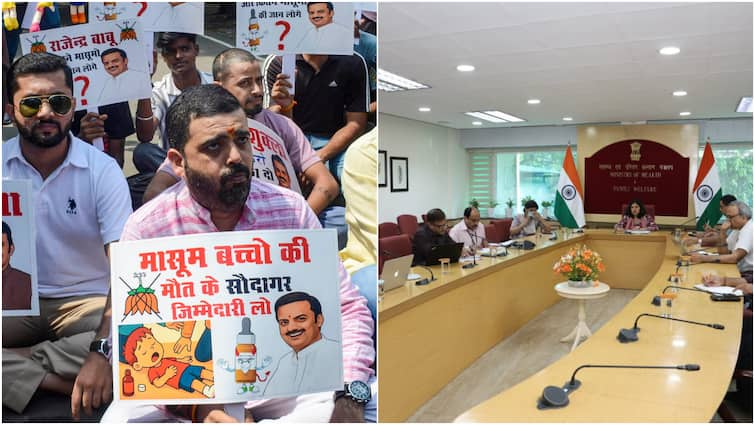In the wake of rising concerns over the safety and quality of cough syrups, particularly those used for children, the Union Ministry of Health and Family Welfare convened a high-level meeting chaired by Union Health Secretary Punya Salila Srivastava to review compliance with drug manufacturing norms and ensure the rational use of paediatric cough formulations.
This comes after at least 14 deaths were reported due to the alleged consumption of a cough syrup in Madhya Pradesh’s Chhindwara. Apart from these deaths, eight children were admitted to Chhindwara’s Nagpur hospital, Additional District Magistrate of Chhindwara, Dhirendra Singh, told news agency ANI.
According to an official release by the Health Ministry, the meeting followed directions from Union Health Minister JP Nadda, who had earlier instructed that the issue be discussed with all States and Union Territories to guarantee appropriate regulatory action. The session was attended by senior officials including Amit Agarwal, Secretary of the Department of Pharmaceuticals; Dr Rajiv Bahl, Secretary of the Department of Health Research and Director General of ICMR; Dr Sunita Sharma, Director General of Health Services; Dr Rajeev Raghuvanshi, Drugs Controller General of India; and Dr Ranjan Das, Director of the National Centre for Disease Control (NCDC), alongside health secretaries and drug controllers from across States and UTs.
‘Children Shouldn’t Be Prescribed Cough Syrups’: States Advised To Enforce Norms
The Health Secretary stressed that drug manufacturers must adhere strictly to the Revised Schedule M for Good Manufacturing Practices (GMP). States were also urged to discourage the unnecessary prescription of cough syrups for children, as most coughs are self-limiting.
Dr Rajiv Bahl cautioned that “children should not be prescribed cough syrups or any combination of drugs to prevent any side effects.” He further highlighted that the National Joint Outbreak Response Team is operational to ensure coordination among central health agencies and urged States to bolster their rapid response mechanisms.
Dr Sunita Sharma underscored the limited benefits and potential dangers of paediatric cough syrups, saying such medications carry “significant risks” and should be used with extreme caution. She noted that guidelines for parents, pharmacists, and doctors would soon be finalised.
Meanwhile, Dr Rajeev Raghuvanshi reiterated that States must ensure full compliance with GMP norms and mentioned that certain manufacturers availing government assistance for infrastructure upgradation have been granted extensions until December 2025.
The deliberations revolved around three core areas — ensuring adherence to Schedule M and other standards related to drug manufacturing, discouraging the irrational use of cough syrups among children, and strengthening regulation of retail pharmacies to prevent misuse.
Investigation and Preliminary Findings
The Metropolitan Surveillance Unit (MSU) in Nagpur, under the Pradhan Mantri-Ayushman Bharat Health Infrastructure Mission (PM-ABHIM), had reported a cluster of such cases to the NCDC.
A central team comprising epidemiologists, microbiologists, entomologists, and drug inspectors from NCDC, National Institute of Virology (NIV) and Central Drugs Standard Control Organisation (CDSCO) was dispatched to Chhindwara and Nagpur to investigate. Samples collected from the sites were sent to NIV Pune, Central Drug Laboratory (CDL) Mumbai, and NEERI Nagpur for testing.
Preliminary tests ruled out common infectious diseases except one leptospirosis case. Of the 10 medicine samples analysed so far, nine were found compliant, while one cough syrup — ‘Coldrif’ — contained Diethylene Glycol (DEG) beyond permissible limits. The Tamil Nadu FDA has since taken regulatory action against the manufacturing unit based in Kancheepuram, with CDSCO recommending licence cancellation and initiation of criminal proceedings.
The Ministry informed that Risk-Based Inspections (RBI) have been initiated across 19 manufacturing units in six States to identify systemic gaps in drug production. States were also asked to ensure prompt disease reporting, wider use of community reporting tools under IDSP-IHIP, and improved inter-state coordination during health emergencies.
The Department of Pharmaceuticals said several companies have started participating in the Revamped Pharmaceuticals Technology Upgradation Assistance Scheme (RPTUAS) for GMP enhancement.
Rajasthan’s Health Department shared that its investigation found no direct link between the recent child deaths and the quality of cough syrup, but an awareness campaign on the rational use of paediatric formulations has been launched. In Maharashtra, the Health Secretary stated that hospitalised children in Nagpur are receiving optimal care.
Maharashtra, Uttarakhand Issue Key Directives
Maharashtra’s FDA ordered an immediate ban on the sale, distribution, and use of Coldrif syrup (Batch No. SR 13), directing all those in possession to report to the Drug Control Authorities.
Meanwhile, Uttarakhand Health Secretary and Food Safety Commissioner Dr R. Rajesh Kumar issued instructions to all District Magistrates and Chief Medical Officers to ensure that no cough or cold medication is given to children below two years of age.
He stated that for children under five, “the routine use of such medicines is not recommended” and that they should only be administered “on the advice of a specialist doctor, in the correct dosage, and for the minimum required duration.”
Dr Kumar directed district authorities to collect cough syrup samples for laboratory testing to swiftly identify and remove any substandard or harmful formulations from the market. He also instructed doctors and pharmacists to strictly comply with the Centre’s guidelines.
The Union Health Ministry reaffirmed its commitment to maintaining the highest standards of drug quality and patient safety and urged States and Union Territories to take “swift, coordinated and sustained action” to prevent similar incidents in the future.


)
